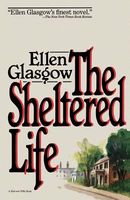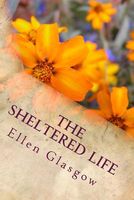- Series
- | Authors
- | Book Release Calendar
- | Search |
- Genres
- | Newsletter
- Welcome to FictionDB, Guest
- | My Account
- | Help

The Sheltered Life — Ellen Glasgow

-
Published:
-
Formats:
Print / eBook -
Main Genre:
General Fiction -
Time Period:
1900's-1910's 20th Century -
Pages:
424 -
Age Level:
22 & up -
Purchase:
-
Share:
Nothing, except the weather report or a general maxim of conduct,is so unsafe to rely upon as a theory of fiction. Every greatnovel has broken many conventions. The greatest of all novelsdefies every formula; and only Mr. Percy Lubbock believes that Warand Peace would be greater if it were another and an entirelydifferent book. By this I do not mean to question Mr. Lubbock'scritical insight. The Craft of Fiction is the best work in itslimited field, and it may be studied to advantage by any novelist.In the first chapters there is a masterly analysis of War andPeace. Yet, after reading this with appreciation, I still thinkthat Tolstoy was the best judge of what his book was about and ofhow long it should be.This brings us, in the beginning, to the most sensitive, andtherefore the most controversial, point in the criticism of prosefiction. It is the habit of overworked or frugal critics to speakas if economy were a virtue and not a necessity. Yet there arefaithful readers who feel with me that a good novel cannot be toolong or a bad novel too short. Our company is small but pickedwith care, and we would die upon the literary barricade defendingthe noble proportions of War and Peace, of The Brothers Karamazov,of Clarissa Harlowe in eight volumes, of Tom Jones, of DavidCopperfield, of The Chronicles of Barsetshire, of A la Recherche duTemps Perdu, of Le Vicomte de Bragelonne. Tennyson was with uswhen he said he had no criticism to make of Clarissa Harlowe exceptthat it might have been longer.The true novel (I am not concerned with the run-of-the-millvariety) is, like pure poetry, an act of birth, not a device or aninvention. It awaits its own time and has its own way to be born,and it cannot, by scientific methods, be pushed into the world frombehind. After it is born, a separate individual, an organicstructure, it obeys its own vital impulses. The heart quickens;the blood circulates; the pulses beat; the whole body moves inresponse to some inward rhythm; and in time the expanding vitalityattains its full stature. But until the breath of life enters anovel, it is as spiritless as inanimate matter.Having said this much, I may confess that spinning theories offiction is my favourite amusement. This is, I think, a good habitto cultivate. The exercise encourages readiness and agility whileit keeps both head and hand in practice. Besides, if it didnothing else, it would still protect one from the radio and themoving picture and other sleepless, if less sinister, enemies tothe lost mood of contemplation. This alone would justify everyprecept that was ever evolved. Although a work of fiction may bewritten without a formula or a method, I doubt if the true novelhas ever been created without the long brooding season.I have read, I believe, with as much interest as if it were a novelitself, every treatise on the art of fiction that appeared to me tobe promising. That variable branch of letters shares withphilosophy the favourite shelf in my library. I know all that suchsources of learning as Sir Leslie Stephen, Sir Walter Raleigh, Mr.Percy Lubbock, Sir Arthur Quiller-Couch, Mr. E. M. Forster, andothers less eminent but often more earnest, are able to teach me,or I am able to acquire. Indeed, I know more than they can teachme, for I know also how very little their knowledge can help one inthe actual writing of novels. If I were giving advice to abeginner (but there are no beginners nowadays, there is only theinspired amateur or the infant pathologist), I should probably saysomething like this: Learn the technique of writing, and havinglearned it thoroughly, try to forget it. Study the principles ofconstruction, the value of continuity, the arrangement of masses,the consistent point of view, the revealing episode, the carefulhandling of detail, and the fatal pitfalls of dialogue. Then,having mastered, if possible, every rule of thumb, dismiss it intothe labyrinth of the memory. Leave it there to make its ownsignals and flash its own warnings. The sensitive feeling, 'thisis not right' or 'something ought to be different' will prove thatthese signals are working. Or, perhaps, this inner voice may beonly the sounder instinct of the born novelist.
Genres
Sub-Genres
Click on any of the links above to see more books like this one.



